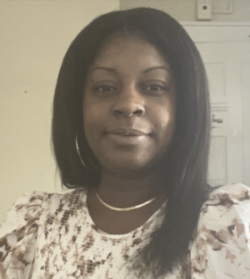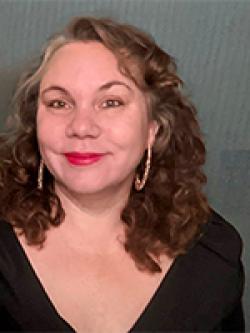What's On Tap for Online Education at CTD?
New leadership team talks about their current work and coming attractions
By Ed Finkel
Before Rashida Clark became assistant coordinator for online programs at CTD in June 2022, she spent about seven years as special projects coordinator at ReGeneration Schools, a Chicago-based nonprofit school management organization, while also teaching a variety of science courses in CTD’s summer and Saturday programs.
 Clark drew from her bachelor’s degree in environmental science and past experience teaching middle-school and high-school students to lead classrooms ranging from PreK to grade 9 in subjects like biology, chemistry, physics and “How Things Work,” an engineering-oriented course. “What drew me to CTD was the openness, and willingness, and freedom to have a syllabus that they give to you, and you can take the syllabus and create amazing lesson plans, and hands-on activities, and allow students to have that freedom to learn,” she says. “Every session I was available, and they asked me to teach, I jumped on it.”
Clark drew from her bachelor’s degree in environmental science and past experience teaching middle-school and high-school students to lead classrooms ranging from PreK to grade 9 in subjects like biology, chemistry, physics and “How Things Work,” an engineering-oriented course. “What drew me to CTD was the openness, and willingness, and freedom to have a syllabus that they give to you, and you can take the syllabus and create amazing lesson plans, and hands-on activities, and allow students to have that freedom to learn,” she says. “Every session I was available, and they asked me to teach, I jumped on it.”
Clark did the same when the assistant coordinator position came open last year. “It’s been interesting coming from the side of an instructor, and now being able to share my experience, and see from the other side of the lens,” she says. “We’re planning and working together to come up with creative new courses for all our different subjects, and working with our families and students to match them, and keep them in our programs through our pathways. We’re also developing relationships with parents, helping them to prepare their students for life, and learning the interests of their child so they can develop critical skills at an early age.”
Before Rebecca Vonesh joined CTD as coordinator of online programs in June 2023, she had taught in Detroit, a small town called Benton, Wisconsin, and later in Milwaukee Public Schools as a curriculum specialist at The Center for Advanced Academics. For 12 years prior to working in Milwaukee, she served as director of the Wisconsin Center for Academically Talented Youth (WCATY), a small nonprofit that later joined the University of Wisconsin-Madison.
There, Vonesh helped to develop online coursework and run the online academy, which works directly with schools, so it was “a slightly different model than what CTD is doing, but similar when it comes to having the opportunity to work with very bright students from a whole range of different school settings and working with the adults who are supporting them—whether that be parents, or teachers—to find their talents, celebrate their students, and stretch them,” she says.
 Vonesh says she “fell in love with working with advanced learners, in part because when you have a group of students who are really engaged, and interested in a topic, and think of themselves as aficionados in that topic they start to bounce ideas and energy off of each other.” Such an environment also enables students from very different backgrounds, a chance to get to know one another—but in a very mediated setting geared toward exchanging thoughts and ideas, she reflects.
Vonesh says she “fell in love with working with advanced learners, in part because when you have a group of students who are really engaged, and interested in a topic, and think of themselves as aficionados in that topic they start to bounce ideas and energy off of each other.” Such an environment also enables students from very different backgrounds, a chance to get to know one another—but in a very mediated setting geared toward exchanging thoughts and ideas, she reflects.
When developing the program and coursework at WCATY, Vonesh says she often looked to CTD as an example, and she is very pleased to have become part of its team. “I’ve been trying to get to know our instructors,” she says. “We sent out self-reflection surveys that we’re getting back from our instructor as we speak, and that’s helping me to see that our staff of around 40 instructors are some of the brightest and strongest around. That’s something I’ve always suspected about CTD. But it’s so cool to be able to read through surveys, and get to feel the enthusiasm of our staff, and to see their wide-ranging backgrounds.”
In the coming year, Vonesh plans to have a sharp focus on rebranding online education in the post-COVID years, after a time in which people might have felt like they overdosed on it—and in some cases experienced a somewhat rushed, less well-organized version of it given the sudden pivot school districts had to make when the pandemic first hit.
“We’re really committed to establishing what great online learning looks like,” she says. “We want to help the community see the value of being able to get kids from a wide range of backgrounds to think deeply together. We have students from more than 20 different countries in our program, and from around the U.S. who are not only all getting a personalized experience, which is definitely a hallmark of the CTD model, but are also learning how to interact in a community of deep thinkers.”
Vonesh and her staff are working through that design tension involved in celebrating and growing students’ own strengths while, at the same time, creating a space where they’re learning from one another. “Part of our passion as people who have the privilege of working with very bright students, is that we are helping shape leaders of tomorrow,” she says. “And we want to help those leaders understand how to employ their talent inside a community, so that we’re thinking about how their intellectual innovations can make change.”
Among the coming attractions in the online program at CTD will be added “custom cohorts” for school groups and school districts, both overseas in places like India and Qatar as well as in regions around the U.S., Clark says. Vonesh adds that this revolves around classes tailored to a particular region’s needs, for example a higher-level topic that “they just don’t have enough students inside one of their schools, or a smaller setting to offer. We’re a great avenue for those schools to bring multiple, small groups of kids together to learn, and think.”
The online family program, a parent-student learning model that’s been offered to families with children aged kindergarten through third grade, this fall will begin providing classes to those with preschool-aged children as well, Clark says. “We’re super-excited to be able to expand and offer those courses for the younger students,” she says. “We make sure that we’re starting, again, with that talent development model, and helping students to shape their thoughts, and learn about concepts and subjects that they’re interested in.” The program also helps the parents or adult caregivers practice ways to encourage higher-level questioning and problem-based learning, which are key to talent development.
A major “coming attraction” that will be rolled out in the coming months, probably in time for the Winter 2024 session, will be a sequence of courses that begins with the youngest students in family-oriented programs focused on artificial intelligence.
“It’ll be really interesting to think about this topic, because it’s such a big, huge, heavy topic that adults are really scrambling around trying to think about,” Vonesh says. “Understanding how information is collected, how it’s organized, and how some of the very basic AI functions, with a little bit of coding mixed in, is where we’re beginning that process.”

